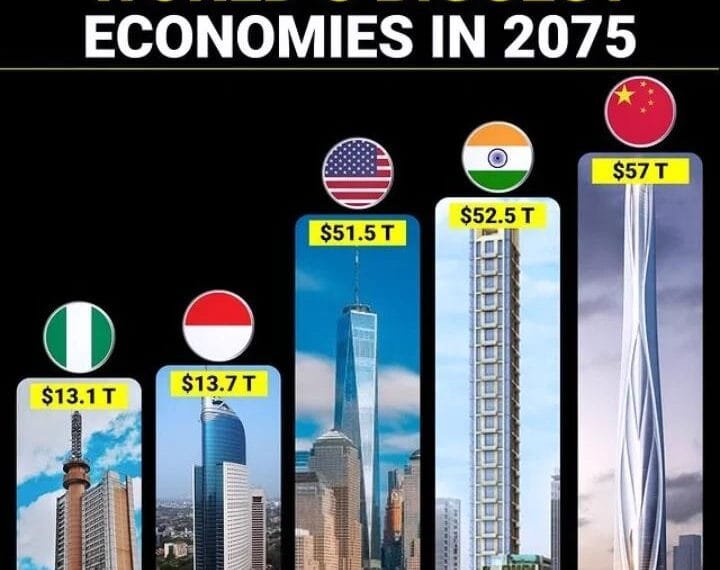Nigeria, Africa’s largest economy and most populous nation, is on track to cement its place among the world’s top five economies by 2075. This groundbreaking projection by financial powerhouses such as Goldman Sachs has captured global attention, highlighting Nigeria’s transformative potential driven by demographic growth, resource wealth, and economic diversification.
Nigeria’s population, currently exceeding 200 million, is projected to soar by mid-century, positioning the country as one of the most populous globally. This demographic surge offers a dual advantage: a massive labor force and a booming consumer market. These elements, combined with a youthful, tech-savvy population, present an unparalleled opportunity for economic expansion.
Historically reliant on oil revenues, Nigeria is actively diversifying its economy to reduce vulnerability to oil price fluctuations. Agriculture, technology, manufacturing, and services are emerging as vital growth sectors. The country’s fertile lands could transform it into a global agricultural hub, catering to the rising demand for food security. Meanwhile, Lagos and other tech hubs are fostering innovation, positioning Nigeria as Africa’s Silicon Valley.
Recent reforms targeting foreign exchange policies, infrastructure development, and ease of doing business have begun reshaping Nigeria’s economic landscape. Sustained reform efforts could attract foreign investments and solidify Nigeria’s global economic influence.
Goldman Sachs predicts Nigeria’s GDP to hit $13.1 trillion by 2075, placing it ahead of global giants like Germany while trailing China, India, the United States, and Indonesia. However, the road to this milestone is full of hurdles. Infrastructure deficits, political instability, security concerns, and the lingering effects of corruption threaten to derail progress.
Read also: Police intercept 59 victims of human trafficking in Abuja
Nigeria’s ascent reflects a broader shift in global economics, where emerging markets in Asia and Africa are poised to challenge traditional economic powerhouses. As China and India redefine global trade, Nigeria is primed to lead Africa’s economic renaissance, paving the way for a new era of influence.
The dream of becoming a global economic titan by 2075 is within Nigeria’s reach, but it requires deliberate actions. Investing in infrastructure, fostering political stability, and championing economic diversification will be key. Addressing security challenges and enhancing governance will also be crucial to unlocking the country’s immense potential.
Nigeria’s journey to the top could reshape global economic landscapes and establish Africa as a major player in the 21st century. If the country navigates its challenges with resilience, its rise will serve as an inspiring story of transformation and global relevance.
Will Nigeria seize the moment and position itself for the global economy? The world is watching.






